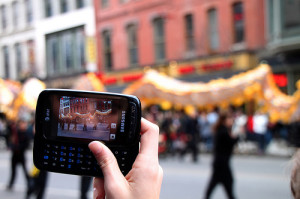With the recent progression of the Occupy movement, the concept of citizen journalism has become increasingly more interesting to me. This interest, in part, is derived from the recent media attention focusing on police brutality (primarily pepper-spraying) at the Occupy protests. The most recently highlighted attack occurred at the University of California, Davis. Video of police officers using pepper spray on seated protestors went viral this past weekend. The video was obviously taken by an attendee or bystander of the protests rather than a member of the press. And in this video you can clearly see spectators with personal cameras documenting the attack.
To learn more about the movement click here.
In a world where YouTube is a primary source for exposure to… well, everything, the idea of citizen journalism seems to be a progressive direction for media to embark on. This is especially true considering we live during a time in which everyone is given a voice via blogs. However, the concept of citizen journalism isn’t exempt from the age-old debate over the tradition of objectivity: is it possible to be a citizen journalist and remain objective?
[This question begs to be reminded of the discussion we had in class regarding the origin of objectivity in the press. Prior to the establishment of the Associated Press, objectivity in journalism was never really the goal. In fact, it was common for newspapers to be entirely biased (which isn’t much different than what we have today with multiple political party-oriented broadcast news channels). The Associated Press’ primary purpose was to provide multiple news outlets with the straight facts so individual newspapers could spin the information to cater to their audience.]
I do believe it is possible to be an objective citizen journalist. Why? Because all journalists tend to report on their area of interest (i.e. war reporters) regardless of whether they are professional journalists. Being passionate about the subject should encourage journalists to learn as much factual information about the subject as possible.
But, even more so, I feel like citizen journalism could be a great thing because of the efforts made by organizations like The Tiziano Project.
The Tiziano Project empowers community members in conflict, post-conflict and under-reported regions by providing them with equipment, training and affiliations necessary to report their stories and improve their lives, according to their mission statement.
This summer, The Tiziano Project held an exhibit at the Iraqi Cultural Center in Washington, DC, showcasing the work of 12 Kurdish students. The exhibit represented the endless possibilities of citizen journalism around the world. It could address misconceptions of various cultures while providing insight into their conditions.
For more on The Tiziano Project click here.
Social media has also allowed for various forms of citizen journalism to rise. This article explains how Facebook and Twitter became an important means of communication during the Cote d’Ivoire conflicts. Both social networking platforms provided assistance to residents in the midst of the warfare, providing them with tips on how to avoid stray bullets and stay safe at home as well as sending alerts via status updates.




Leave a response